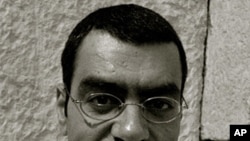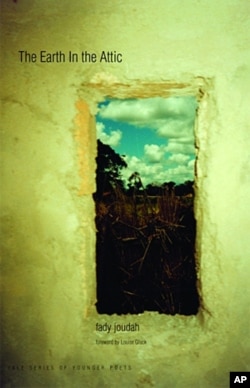Rawi means story-teller in Arabic. It's also the acronym for an organization of Arab American writers. Since 1993, Radius of Arab American Writers, Inc. has given a voice to fiction and non-fiction writers of Arab origin. This month, more than 100 Arab American writers of all genres gathered in Ann Arbor, Michigan, to take part in RAWI's third conference.
Thirty-nine-year old Palestinian-American Fady Joudah is a physician and a poet. His poetry collection, The Earth in the Attic, won the 2007 Yale Younger Poet Series prize. Joudah says the RAWI gathering was an occasion to meet with other poets, novelists, literary critics and scholars of the same background, from the United States and elsewhere.
"This year for instance, we have invited a wonderful novelist, Hisham Matar who lives in the U.K. as well as Fadia Fakir, also a Jordanian novelist who lives in the U.K. to join us and read and participate," Joudah said. "I think the importance is for us to feel that we are not… isolated desert islands in a vast ocean."
Novelist Randa Jarrar, recently elected RAWI's Vice President, says she feels a powerful sense of connection when she attends these meetings.
"If your passion is to write about the fusion between Arab and American cultures, then when you're at a RAWI conference, you're going to be surrounded by people who might share that passion," she added. "If you're concerned about your government, the American government actions abroad, then at a RAWI conference, you're going to definitely find other people who are equally concerned. If you're an Arab American woman writer and you are worried about offending your family or writing about taboo topics, then you're going to find other Arab American women writers who are equally worried and excited to both write about taboos and break them."
Training sessions at the conference offered young writers a chance to learn about the writing and publishing process. The participants had a chance to interact and learn from the experiences of other minorities' writers as well, according to the group's former president, Khalid Mattawa, professor of English at the University of Michigan.
"We had guests who are African American presented their work," says Mattawa. "We had Asian American representations in the conference. We had scholars from Europe coming to do research on Arab American literature.
The three-day event, Mattawa says, was also a forum to discuss the challenges Arab American writers face.
"Of course the issues of immigration, sometimes the perpetual misunderstanding, whether it's racial profiling or culture misrepresentation, that's always a challenge," he said. "But then the story is an art form, it's not a newspaper article. So the challenge of the aesthetics is just as important and significant as the challenge of addressing the issues that are at hand.
To find one's unique voice, he says, Arab American writers need to know where they come from and who they really are.
"There are many Arab Americans here who are not familiar even with their heritage when they aim to present it in a certain manner," said Mattawa. "I think that kind of research is required and is a challenge. The other challenge is to recognize that really our history is part of American history and our literature is part of American and world literature."
Along with the challenges, there are also some exciting new opportunities for the Arab American literary community, according to RAWI's newly-elected president, poet Hayan Charara.
"One of the questions that came up during the conference is where do we go forward, how to reach not just our own people, but those who are either in solidarity with us or who oppose some of the ideas that we are interested in," Charara said. "One of the ways we discussed was teaching. There are so many people who are interested in teaching Arab American literature, yet one of the questions they often have is 'where do we begin?' There are also a larger number of people who are studying Arab American literature on the college level and in post graduate work. So there is really a growing interest and we're seeing more publication of articles on Arab American literature as well."
Charara says the writer's group is exploring ways to use the growing public interest to encourage and support new Arab-American literary voices:
"We've talked about doing things like writers retreats, branching out to younger writers in schools and seeing what we can do in the early stages of their careers and also possibly establishing a kind of archive of Arab American literature and critical writings for scholars who may or may not be Arab themselves to be able to go to and use as a valuable resource," Charara adds.
Poet and RAWI president Hayan Charara says his group will keep its community of Arab American writers in touch with each other through e-mails and newsletters until RAWI's next meeting.





